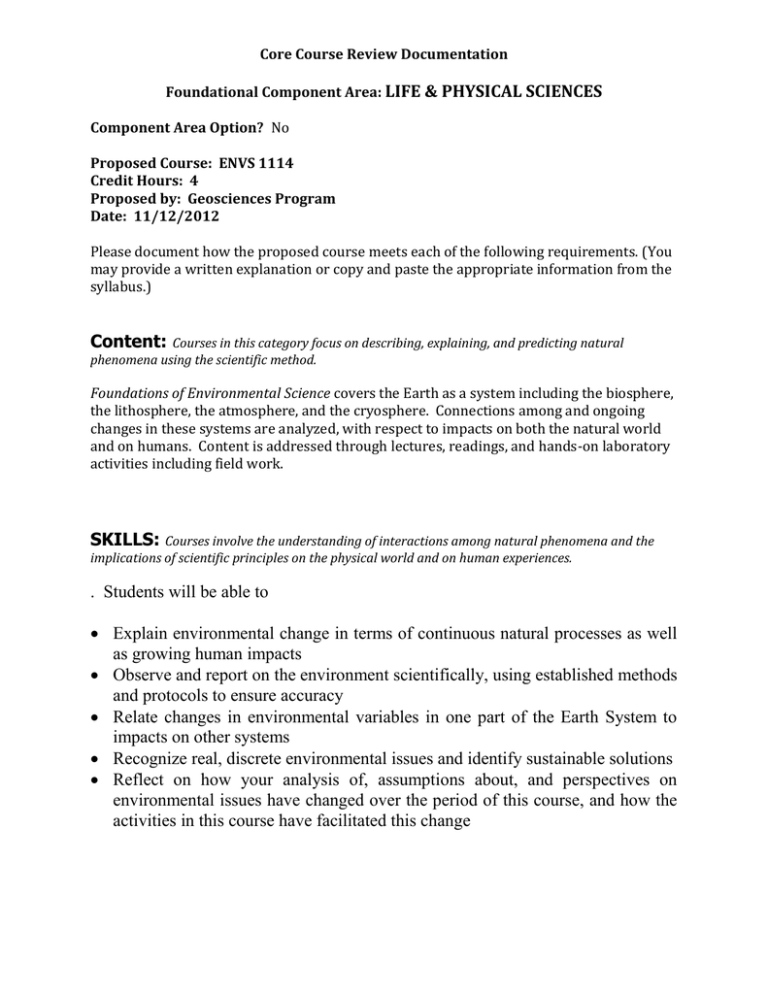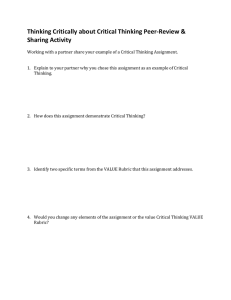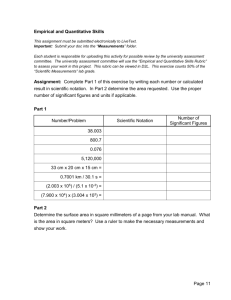LIFE & PHYSICAL SCIENCES
advertisement

Core Course Review Documentation Foundational Component Area: LIFE & PHYSICAL SCIENCES Component Area Option? No Proposed Course: ENVS 1114 Credit Hours: 4 Proposed by: Geosciences Program Date: 11/12/2012 Please document how the proposed course meets each of the following requirements. (You may provide a written explanation or copy and paste the appropriate information from the syllabus.) Content: Courses in this category focus on describing, explaining, and predicting natural phenomena using the scientific method. Foundations of Environmental Science covers the Earth as a system including the biosphere, the lithosphere, the atmosphere, and the cryosphere. Connections among and ongoing changes in these systems are analyzed, with respect to impacts on both the natural world and on humans. Content is addressed through lectures, readings, and hands-on laboratory activities including field work. SKILLS: Courses involve the understanding of interactions among natural phenomena and the implications of scientific principles on the physical world and on human experiences. . Students will be able to Explain environmental change in terms of continuous natural processes as well as growing human impacts Observe and report on the environment scientifically, using established methods and protocols to ensure accuracy Relate changes in environmental variables in one part of the Earth System to impacts on other systems Recognize real, discrete environmental issues and identify sustainable solutions Reflect on how your analysis of, assumptions about, and perspectives on environmental issues have changed over the period of this course, and how the activities in this course have facilitated this change ASSESSMENT OF CORE OBJECTIVES: Assessments should be authentic, intentional and direct. The following four Core Objectives must be addressed in each course approved to fulfill this category requirement: Critical Thinking Skills - to include creative thinking, innovation, inquiry, and analysis, evaluation and synthesis of information Critical thinking skills are developed through course readings, lectures, documentary films, and group projects, and a journaling activity There are two separate activities that will assess critical thinking in this course. One is an Environmental Focus Project (attached) in which students will select an issue of environmental interest and the human behaviors that negatively or positively affect it. Students will present this information to the class, and will identify and promote alternative behaviors that would reduce the negative effects (or enhance the positive effects) of the issue. Additionally, a Journal Project (attached) will be used to assess critical thinking skills. Students will keep a journal where they will answer questions on natural or anthropogenic events or issues related to the environment. They will describe the impact of the event on the Earth’s many systems (atmosphere, hydrosphere, etc.) and evaluate the science in the references that they choose to aid their journal entries. A final two-paragraph selfassessment addressing how this assignment has altered their view will be included. Both projects will assessed using a shortened version (attached with both projects above) of the AACU Rubric for Critical Thinking Skills. Three rows of the rubric will be utilized (Explanation of issues, Evidence, and Conclusions/Outcomes), and students will be expected to exceed the benchmark (level 0) of the rubric. Communication Skills - to include effective development, interpretation and expression of ideas through written, oral, and visual communication Oral communication and Written communication skills are developed through preparation of presentations and journal entries concerning environmental issues chosen by students. The Environmental Focus Project (attached) mentioned above will also be used to assess oral communication skills. Students will present information on environmental issues to the class, utilizing PowerPoint. Oral Communication skills will be assessed using a shortened version (attached) of the AACU Rubric for Oral Communication skills. Three rows of the rubric will be utilized (Organization, Supporting Materials, and Central Message), and students will be expected to exceed the benchmark (level 0) of the rubric. Written communication skills are developed through the previously mentioned journaling activity (attached). Two rows of the AACU rubric for Written Communication Skills will be utilized (Context and Purpose, and Disciplinary Conventions), and students will be expected to exceed the benchmark (level 0) of the rubric. Empirical and Quantitative Skills - to include the manipulation and analysis of numerical data or observable facts resulting in informed conclusions Empirical analytical skills and quantitative skills are developed through assigned readings, documentary films, and laboratory activities. The specific assignment used to assess Empirical and Quantitative Skills in this course is an exercise on Random Sampling of Data (attached). Students will learn that one way to estimate the size of a population is to collect data by taking random samples. A series of questions allows students to analyze the concepts of the activity. Two rows of the AACU rubric for Quantitative Literacy will be utilized (Calculation and Application/Analysis), and students will be expected to exceed the benchmark (level 0) of the rubric. Teamwork - to include the ability to consider different points of view and to work effectively with others to support a shared purpose or goal Teamwork skills are developed through group projects in class and in laboratory. The Environmental Focus Project (attached) mentioned above will also be used to assess teamwork skills. Students will form teams to research and present information on environmental issues. Teamwork skills will be assessed using a shortened version (attached) of the AACU Rubric for Teamwork. Two rows of the rubric will be utilized (Contributes to Team Meetings and Individual Contribution Outside of Team Meetings), and students will be expected to exceed the benchmark (level 0) of the rubric. ADDITIONAL INFORMATION: Provide any additional information supporting course inclusion in the core (optional). PLEASE ATTACH THE FOLLOWING 1. 2. 3. 4. Syllabus Assessment for Critical Thinking Skills, Oral Communication Skills, and Teamwork Assessment for Written Communication Skills and Critical thinking Skills Assessment for Empirical & Quantitative Skills

